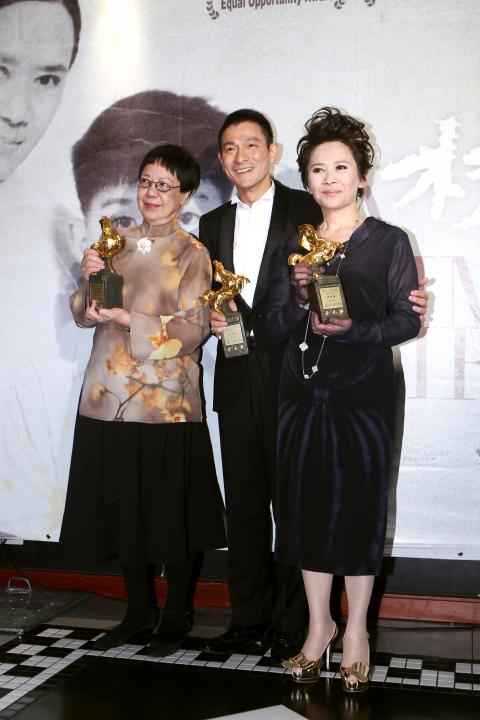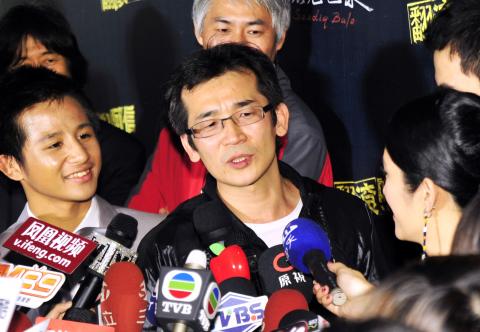Hong Kong cinema had its moment to shine at the 48th Golden Horse Awards (金馬獎), which was held at the Hsinchu City Performance Hall of Bureau of Cultural Affairs (新竹市文化局演藝廳) on Saturday night. Ann Hui (許鞍華) won Best Director for A Simple Life (桃姐). The film’s two leads, Deanie Ip (葉德嫻) and Andy Lau (劉德華), were honored as Best Leading Actress and Best Leading Actor respectively.
Meanwhile, Wei Te-sheng’s (魏德聖) Seediq Bale (賽德克‧巴萊) lived up to expectations and took home the trophy for Best Feature Film.
Awarded for his quiet, close-to-life performance, Lau expressed his worries about Hong Kong cinema when receiving the top honor on stage, “I was there when Taiwan [cinema] was in decline. Now Hong Kong [cinema] is experiencing its worst time. I hope we can be as strong and persistent as you are, and like you, we may rise again,” the actor said.

Photo: Taipei Times
A key figure in the Hong Kong New Wave during the 1970s and 1980s, Hui echoed Lau’s sentiment. “I hope the film can do well at the box office, so that more investors are willing to make movies like this and give more chances to young filmmakers,” she said backstage.
According to jury chairwoman Sylvia Chang (張艾嘉), Seediq Bale bested two strong contenders, A Simple Life and Chinese actor and director Jiang Wen’s (姜文) box-office sensation Let The Bullets Fly (讓子彈飛), in the Best Feature Film department, because of its even performance in the 11 categories for which it was nominated.
“It scored nicely in every category… Wei himself said it has imperfections, but overall it is the best work,” Chang said.

Photo: Taipei Times
Backstage, Wei admitted feeling a bit uneasy for picking up the top honor amid other strong films. “I know that we made the production too big for us to handle. There are flaws, but I will make up for it in my next film,” the director said.
Apart from Ip and Chinese actress Tang Qun (唐群), honored as the Best Supporting Actress for her role in Return Ticket (到阜陽六百里), the female actors were not given enough space to shine in the movies they were nominated for. This is the result of negligence over female roles in today’s Chinese-speaking movies, Chang pointed out.
Wen Tien-hsiang (聞天祥), the awards and festival CEO, agreed. “Actresses are not given the same opportunities as male actors,” Wen said.
As a surprise to many, Mongolian director Wuershan (烏爾善) from China beat out hopeful winner Giddens Ko (柯景騰), better known as Jiubadao (九把刀 or “Nine Knives”), to walk away with the honor for best new director. His debut feature The Butcher, the Chef and the Swordsman (刀見笑), a stylistic, high-speed concoction of slapstick, comedy and martial-arts thriller, has attracted Fox International Productions to handle its oversea distribution.
“I came to Taiwan for the food. Winning the award was really an accident,” Wuershan said at backstage.
Another surprise winner was Ko Chen-tung (柯震東), who beat out the three Aboriginal contenders from Seediq Bale to take home the trophy in the Best New Performer for his performance in You Are the Apple of My Eye (那些年,我們ㄧ起追的女孩). Jury chairwoman Chang said Ko won the award for his “natural command of emotions, body and speech.”
“The judges want to see whether an actor is only chosen to make one movie or [he or she] has potential to develop an acting career,” Chang pointed out.
Big-budget commercial films faired well in the technical categories. Peter Chan Ho-sun’s (陳可辛) star-studded blockbuster Wu Xia (武俠) won Best Visual Effects, Best Art Direction and Best Action Choreography, while Let The Bullets Fly picked up awards for Best Adapted Screenplay and Cinematography.
Standing out from among the big-budget features, Taiwan’s indie documentary production The Man Behind the Book (尋找背海的人), won Best Film Editing. This was largely thanks to veteran editor Chen Hsiao-tung (陳曉東), noted not only for his decades-long collaboration with established directors but his support for young filmmakers as well.
In the eyes of Chang, the nominated films at the Golden Horse reflect a polarization that worries her. “Now we only have movies with either really big budgets or very small ones. There is nothing in between. There is no diversity. I think it is something we all have to think about,” she pointed out.
This year, the Golden Horse Awards decided to stop handing out the Outstanding Taiwanese Film of the Year award. According to Wen, this is due to the increasingly close collaboration among filmmakers in Chinese-speaking regions, which makes it more and more difficult to decide the origin of a film. The fact that Taiwanese cinema has taken off also makes the award, set up to encourage the local film industry, seem superfluous.
Outstanding Taiwanese filmmakers where still honored, with Wong Wei-liu (王偉六), nominated for his hard work as a key grip in Seediq Bale, winning outstanding Taiwanese filmmaker of the Year. Over the past 30 years, Wong has participated in more than 100 movies with directors such as Hou Hsiao-hsien (侯孝賢), Tsai Ming-liang (蔡明亮), Wu Nien-jen (吳念真), Tom Lin Shu-yu (林書宇) and Jay Chou (周杰倫). The unsung hero finally had his moment of glory as people like Hou and Doze Niu (鈕承澤) rushed to congratulated him after he won the award.
The award ceremony attracted a crowd of A-list stars and celebrities including Shu Qi (舒淇), Carina Lau (劉嘉玲), Chen Kuo-fu (陳國富) and Tang Wei (湯唯).
The 48th Golden Horse Awards Winner List
Best Feature Film
Warriors of the Rainbow: Seediq Bale (賽德克˙巴萊)
Best Director
Ann Hui (許鞍華)
Best New Director
Wuershan (烏爾善)
Best Leading Actor
Andy Lau (劉德華)
Best Leading Actress
Deanie Ip (葉德嫻)
Best Supporting Actor
Bokeh Kosang (徐詣帆)
Best Supporting Actress
Tang Qun (唐群)
Best New Performer
Ko Chen-Tung (柯震東)
Best Original Screenplay
Yang Nan-chian (楊南倩), Teng Yung-shing (鄧勇星), Qin Hailu (秦海璐), Ge Wen-zhe (葛文吉吉), Xi Ran (席然) for Return Ticket (到阜陽六百里)
Best Adapted Screenplay
Zhu Sujin (朱蘇進), Shu Ping (述平), Jiang Wen (姜文), Guo Junli (郭俊立), Wei Xiao (危笑), Li Bukong (李不空) for Let the Bullets Fly (讓子彈飛)
Best Cinematography
Zhao Fei (趙非) for Let the Bullets Fly (讓子彈飛)
Best Visual Effects
Yung Kwok-yin (翁國賢), Andy Kang (姜鍾翔) for Wu Xia (武俠)
Best Art Direction
Yee Chung-man (奚仲文), Sun Li (孫立) for Wu Xia (武俠)
Best Makeup & Costume Design
Hao Yi (郝藝) for The Butcher, the Chef and the Swordsman (刀見笑)
Best Action Choreography
Donnie Yen (甄子丹) for Wu Xia (武俠)
Best Original Film Score
Ricky Ho (何國杰) for Seediq Bale (賽德克˙巴萊)
Best Original Film Song
Perfect Landing (完美落地) in Jump! Ashin (翻滾吧!阿信)
Lyricist: Luantan A-hsiang (亂彈阿翔), Composer: Luantan A-hsiang (亂彈阿翔), Performer: Luantan A-hsiang (亂彈阿翔)
Best Film Editing
Chen Hsiao-tung (陳曉東) for The Man Behind the Book (尋找背海的人)
Best Sound Effects
Tu Duu-chih (杜篤之), Tang Shiang-chu (湯湘竹), Wu Shu-yao (吳書瑤) for Seediq Bale (賽德克˙巴萊)
Best Short Film
Thief (小偷)
Best Documentary
Hometown Boy (金城小子)
Outstanding Taiwanese Filmmaker of the Year
Wong Wei-liu (王偉六)
Lifetime Achievement Award
Ting Shan-si (丁善璽)

The canonical shot of an East Asian city is a night skyline studded with towering apartment and office buildings, bright with neon and plastic signage, a landscape of energy and modernity. Another classic image is the same city seen from above, in which identical apartment towers march across the city, spilling out over nearby geography, like stylized soldiers colonizing new territory in a board game. Densely populated dynamic conurbations of money, technological innovation and convenience, it is hard to see the cities of East Asia as what they truly are: necropolises. Why is this? The East Asian development model, with

June 16 to June 22 The following flyer appeared on the streets of Hsinchu on June 12, 1895: “Taipei has already fallen to the Japanese barbarians, who have brought great misery to our land and people. We heard that the Japanese occupiers will tax our gardens, our houses, our bodies, and even our chickens, dogs, cows and pigs. They wear their hair wild, carve their teeth, tattoo their foreheads, wear strange clothes and speak a strange language. How can we be ruled by such people?” Posted by civilian militia leader Wu Tang-hsing (吳湯興), it was a call to arms to retake

This is a deeply unsettling period in Taiwan. Uncertainties are everywhere while everyone waits for a small army of other shoes to drop on nearly every front. During challenging times, interesting political changes can happen, yet all three major political parties are beset with scandals, strife and self-inflicted wounds. As the ruling party, the Democratic Progressive Party (DPP) is held accountable for not only the challenges to the party, but also the nation. Taiwan is geopolitically and economically under threat. Domestically, the administration is under siege by the opposition-controlled legislature and growing discontent with what opponents characterize as arrogant, autocratic

When Lisa, 20, laces into her ultra-high heels for her shift at a strip club in Ukraine’s Kharkiv, she knows that aside from dancing, she will have to comfort traumatized soldiers. Since Russia’s 2022 invasion, exhausted troops are the main clientele of the Flash Dancers club in the center of the northeastern city, just 20 kilometers from Russian forces. For some customers, it provides an “escape” from the war, said Valerya Zavatska — a 25-year-old law graduate who runs the club with her mother, an ex-dancer. But many are not there just for the show. They “want to talk about what hurts,” she